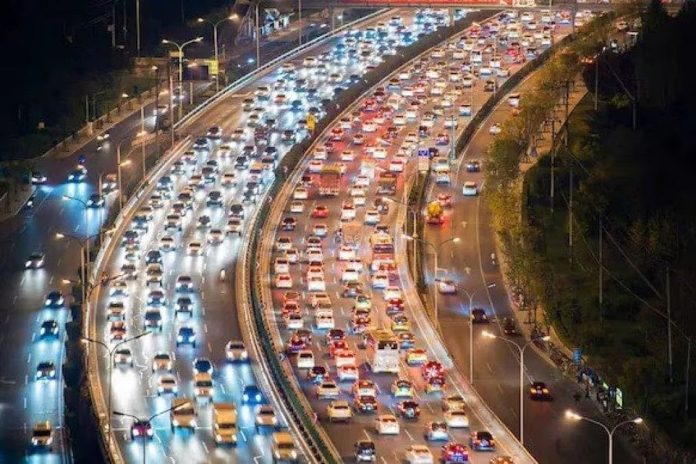Less than a week after Bengaluru suffered through a notorious traffic jam, the state government appears to have exacerbated citizen’s woes by prohibiting carpooling.
Even as Bengaluru continues its deliberations on the unusual traffic congestion on ORR that occurred last Wednesday, the Karnataka government, on Saturday (30 September), announced the prohibition of carpooling in the city — a move that could further exacerbate the city’s traffic chaos.
Bangalore Great Traffic Problem
The dire situation, which left people in parts of eastern Bengaluru stranded for several hours and brought the city’s tech hub to a standstill, once again highlighted the concerns surrounding the escalating vehicle usage, and focusing on transit alternatives in the city.
However, just two days after this incident, the Congress government chose to restrict one such alternative, following complaints from taxi driver associations.
Consequently, this prohibition has directly impacted numerous carpooling platforms that were that were widely used by the city residents.
Why The Ban?
The Karnataka transport department has labelled the use of private vehicles for ride-sharing as “illegal” and has threatened fines ranging from Rs 5,000 to Rs 10,000 for anyone operating such services.
Ride-hailing apps such as BlaBla Car, Quickride, Rideshare, Commute Easy, and Carpool Adda had been providing carpool services for individuals seeking to share rides for a fee.
The ban on this came reportedly due to the protests and complaints lodged by local taxi drivers, who demanded government action against these services.
Taxi associations and autorickshaw drivers’ unions said that the carpooling services are affecting their daily earnings.
They recently conducted a Bandh in Bengaluru and submitted a list of demands to Karnataka’s transport minister, Ramalinga Reddy.
Furthermore, recently, MoneyControl reported an incident at Manyata Tech Park in Bengaluru’s Nagawara, where cab drivers harassed Quick Ride users and claimed carpooling was illegal.
An official from Karnataka Rajya Chalakara Parishat argued that taxi drivers must adhere to regulations, obtain permits, and pay taxes, while these carpooling apps are operating without licenses.
This ban on carpooling has been enforced, despite continuous grievances about traffic congestion in Bengaluru, frequent unavailability of taxis, and the steep prices for short intra-city journeys.
Carpooling For City Professionals
Carpooling acted as a significant factor in reducing the number of vehicles on Bengaluru’s roads during peak hours. Many IT employees relied on these services to commute to work from their homes, given Bengaluru’s high traffic density and the city’s almost one vehicle per person ratio.
To tackle this and similar issues, many cities are experimenting with measures to encourage the use of public transportation and limit/restrict single occupancy vehicles in urban centres.
Towards this end, carpooling offers a sustainable mode of travel for many, reduces traffic congestion, and also the demand for parking spaces.
In recent years, advancements in technology, social networking, location-based services, and cloud technologies have fostered the growth of shared and on-demand mobility.
Commuters can easily find carpool rides through smartphone apps or websites, allowing ride-seekers to match with ride-givers heading in the same direction. Rides can be shared within a city and for long-distance trips between cities too.
Globally, where cities are constantly innovating to regulate traffic and promote community development, the ban on carpooling in Bengaluru appears to be a step backward, driven by lobbying from taxi unions.
According to data, Bengaluru continued to lead the way in embracing carpooling as an alternative transportation method, with an impressive 800,000 km carpooled in a single day.
A Ban Will Not Help Bengaluru’s Increasing Traffic
Carpooling apps remained a convenient and cost-effective way for the public to navigate Bengaluru’s traffic, offering them respite from the daily commute.
According to the MC report, KNM Rao, Founder & CEO of Quick Ride, which was established in 2015, expressed, “Through various campaigns, we have been urging professionals to share vehicles and save road space and traffic. Some individuals are spreading propaganda that carpooling is illegal and harassing professionals who carpool, stopping them on the road and instilling fear in the carpooling community.”
Platforms like Quick Ride cater to private car owners who are willing to share their vehicles with others traveling along the same route.
Users — mostly working professionals —are required to verify their phone numbers and work email IDs during registration.
As per pre-pandemic data, Quick Ride boasted 6.5 lakh registered users in Bengaluru. Notably, Quick Ride’s data reveals that 45 per cent of its active car poolers in the city were women, while similar usage patterns were obtained in other major Indian cities.
Make It Unambiguous
However, the legal status of such carpooling models remains ambiguous, as there are no specific provisions for carpooling in Section 66 of the Motor Vehicles Act. It highlights concerns regarding the blurred line between private and commercial services.
The alleged priority given to cab drivers unions over carpooling services underscores the government’s inclination towards satisfying traditional voter constituencies through incentives, and maintaining the status quo, largely influenced by their lobbying efforts.
This approach seems to hinder the city’s willingness to explore innovative solutions and power of citizen participation, which can be a driving force in reshaping the city’s challenges and future.
Technology-enabled shared mobility solutions like carpooling platforms hold tremendous potential to enhance the efficiency of urban transportation in our cities.
As a ban may not seem to be a comprehensive solution to the escalating challenges.


